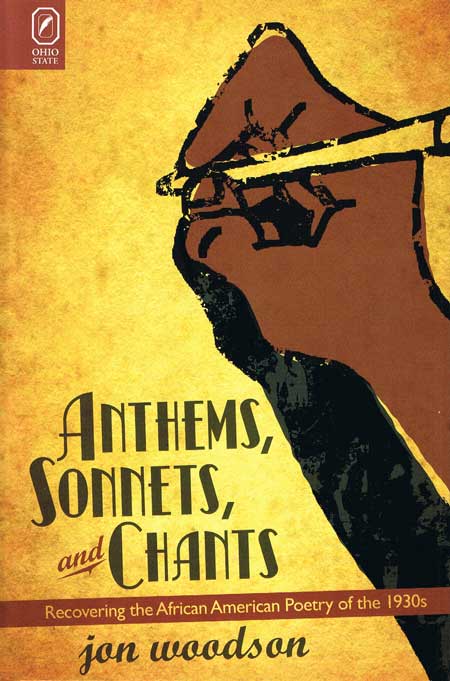Anthems, Sonnets, and ChantsRecovering the African American Poetry of the 1930sJon Woodson |
 12/29/2010 Literary Criticism/American/African American; Literary Criticism/Poetry 272 pp. 6x9  $55.95 cloth 978-0-8142-1146-5 Add cloth to shopping cart $14.95 CD 978-0-8142-9245-7 Add CD to shopping cart $27.95 paper 978-0-8142-5249-9 Add paper to shopping cart Shopping Cart Instructions Review/Change Shopping Cart & Check-out | |||
|
Table of Contents
Explore More New Deal Art during the Great Depression Friedrich A. Kittler, Gramophone, Film, Typewriter Rachel Blau DuPlessis, Genders, Races, and Religious Cultures in Modern American Poetry, 1908–1934 |
“Jon Woodson’s Anthems, Sonnets, and Chants is a thoroughly engaging work. He makes a convincing case for not only reading a wide range of neglected poetry from the period, but for reading it through the rich interpretive lens he provides. This is a major work of scholarship which genuinely breaks new ground in the field.” —James A. Miller, professor of English and American studies, The George Washington University In the 1930s African Americans faced three distinct historical crises that impacted the lives of African Americans directly—the Great Depression, the existential-identity crisis, and the Italo-Ethiopian War, with its threat of a race war. A sizeable body of black poetry was produced in this decade, which captured the new modes of autonomy through which black Americans resisted these social calamities. Much of it, however, including the most influential protest poems, was dismissed as “romantic” by major, leftist critics and anthologists. Anthems, Sonnets, and Chants: Recovering the African American Poetry of the 1930s, by Jon Woodson, uses social philology to unveil social discourse, self fashioning, and debates in poems gathered from anthologies, magazines, newspapers, and individual collections. The first chapter examines three long poems, finding overarching jeremiadic discourse that inaugurated a militant, politically aware agent. Chapter two examines self-fashioning in the numerous sonnets that responded to the new media of radio, newsreels, movies, and photo-magazines. The third chapter shows how new subjectivities were generated by poetry addressed to the threat of race war in which the white race was exterminated. The black intellectuals who dominated the interpretative discourses of the 1930s fostered exteriority, while black culture as a whole plunged into interiority. Anthems, Sonnets, and Chants delineates the struggle between these inner and outer worlds, a study made difficult by a contemporary intellectual culture which recoils from a belief in a consistent, integrated self.
| |||


 Jon Woodson
Jon Woodson